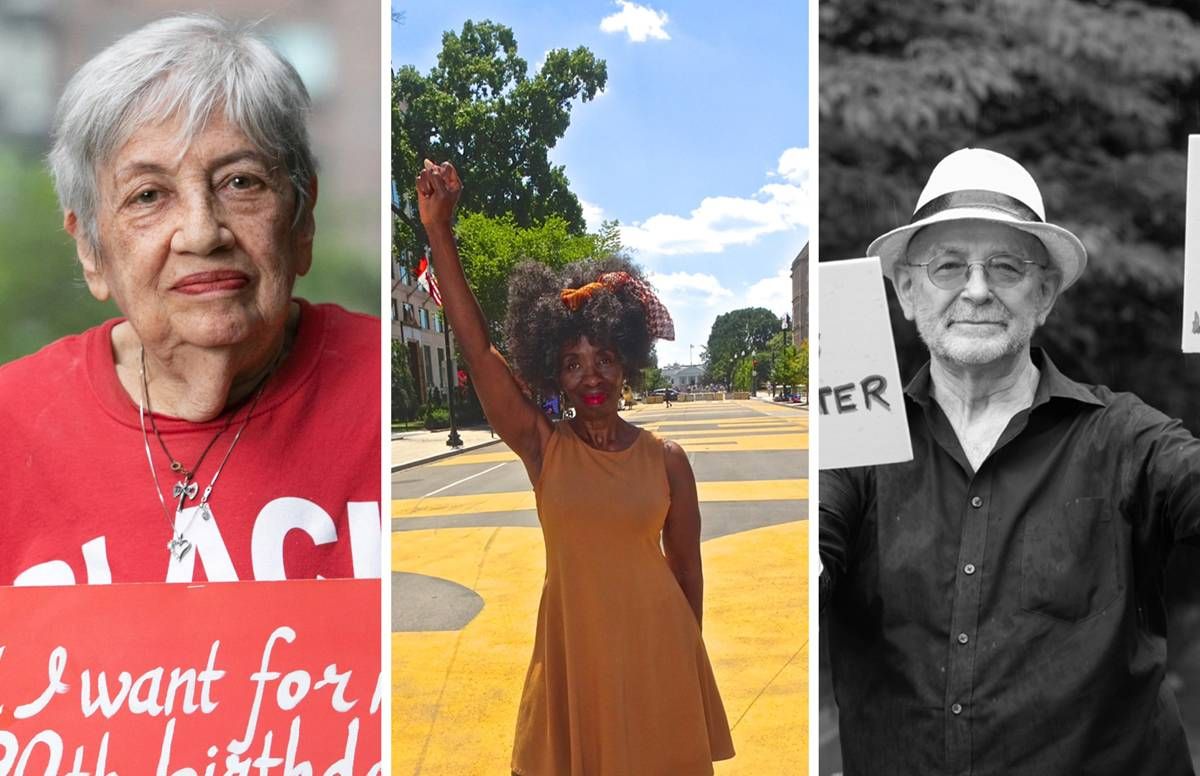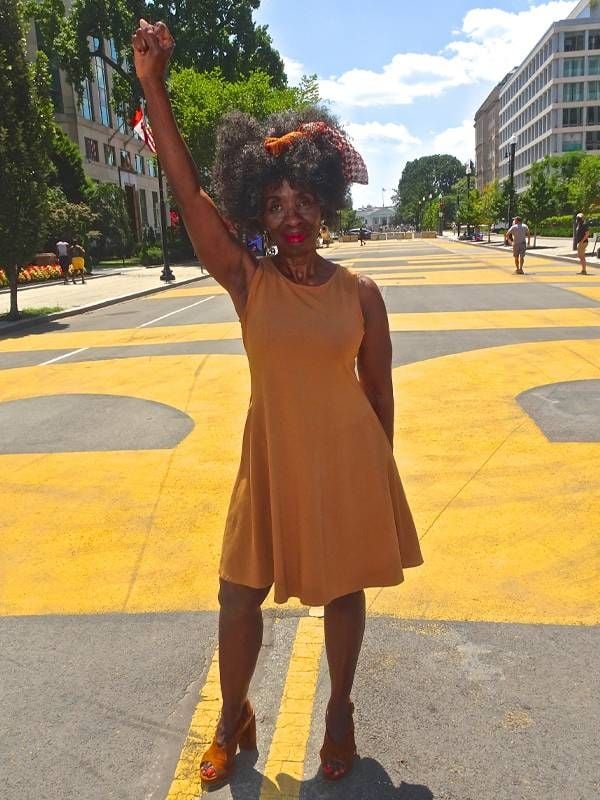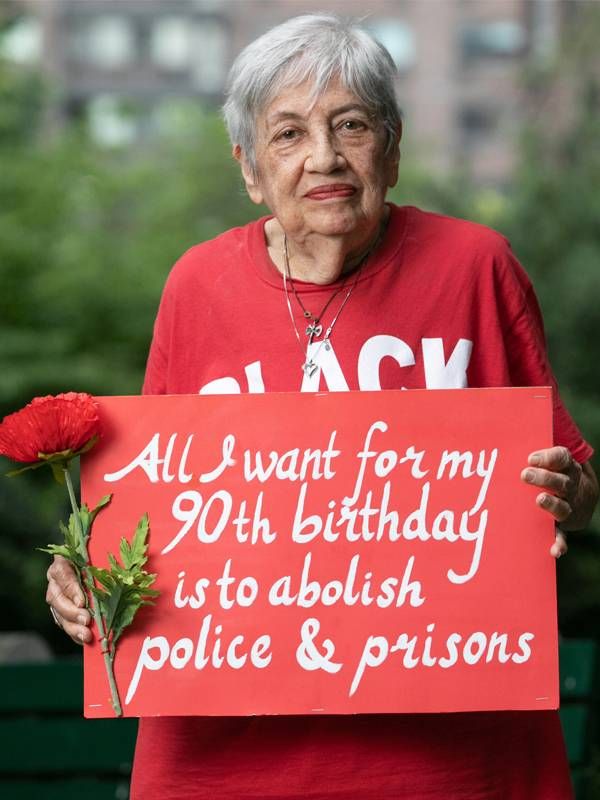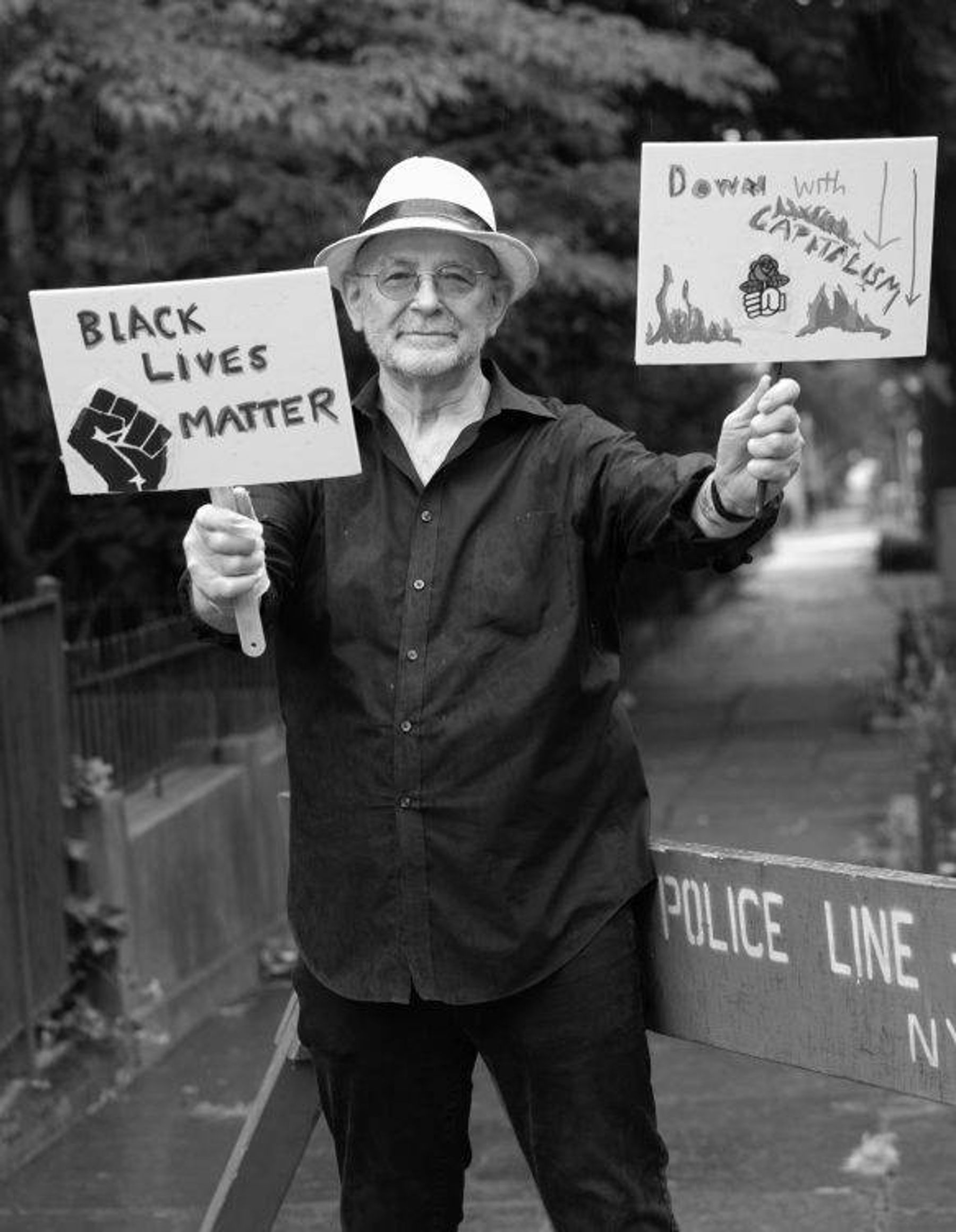3 Activists Over 65 Weigh In, and Act Out, on Black Lives Matter
Says one: 'I feel optimism, but I guard my heart'
Chatting with my pal, singer/actor/playwright Héctor Lionel, we wanted to do a pictorial article of the 60+ crowd who had to skip the Black Lives Matter demonstrations for health reasons. What I found instead: vital, involved, fascinating political creatures bringing their own history, lessons and know-how to the movement. They needed to be heard — and seen.

Here are three of them:
Elizabeth White, 66
Her sophisticated mind is a delicious combination of scrappy, wise, confident and worldly. She’s a member of my Glorious Broads clan (my site celebrating a certain kind of woman). I fell in insta-love with her in-your-faceness at The Atlantic’s New Old Age conference. She’s also a Next Avenue Influencer in Aging and a TEDTalk star who speaks and writes about aging and financial insecurity. Elizabeth White has been out demonstrating — not leading chants but, like so many of us, exploring options for what’s next.

Were you an activist in the 60s?
I think I was more of a good girl. You know, do my work, get a job, be responsible. I was that person.
And now you have blossomed into a badass rabble-rouser…
I guess I have. (laughs)
Tell me about you in the ‘60s…
I was coming back to the states at sixteen after being abroad for a long time — entering the middle of “I’m Black and I’m proud.”
I was on my own inward journey to find my footing in a world that was not accepting of me and finding my footing within the Black community as well.
"Now, people are prepared to take more risk, to be more confrontational."
How does what happened in the Black movement then relate to now?
I have lived through segregation, integration, affirmative action, diversity, inclusion and equity.
What does inclusion really mean? That if you behave yourself, you’ll be invited into the circle.
So, what does behave yourself mean? When you get into the circle, you will be as invested as everyone else to maintain the status quo. And we understand that as women, and I understand that as a Black person. You can be in that room and be no more than a decoration.
What I see happening now is a pushing against those boundaries.
What does this pushing look like?
Black generals traditionally would never speak out about what they encountered moving up through the ranks. Black executives who get into that inner sanctum now are beginning to speak out about the cost of being in there. A number of Black friends in organizations are being asked by senior executives, ‘What should we do?’ And they are trying to weigh the balance. Can they be candid without consequences? Or are they expected to not rock the boat …
’Cause I think one of the things in our DNA — a long time ago we learned not to antagonize the person with the whip. And it takes some skill to get the person who has the whip to put it down by their side — and then to drop it to the ground.
In any interracial setting, Black people are always doing that calculus. Now, people are prepared to take more risk, to be more confrontational.
With the new generation — are they thinking about the whip?
Depends on the age. Eighty percent of people over sixty-five are white. With Gen Z, fifty-two percent are white. They acknowledge the whip, and have willingness to join together. This is very different from when we were coming up.
Older white people have a posture of helping — ‘we’re gonna help you’ — but the young white kids are putting their bodies on the line. Getting thrown out because they can’t support their parents’ racist views.
White young people getting in front of Black people to protect them from advancing police. It’s not ‘I wanna help you’ — it’s ‘I am as invested in the outcome as you are.'
So, this must give you hope …
I feel optimism — but I guard my heart.
Why are you guarded?
There is so much work to do — and there will be cost. And casualties. Consequences. Will people have the stamina? Will white people keep going?
But hope: The size of the crowds in Portland. And the brigade of mothers and grandmothers that were coming out in droves.
I get chills …
You are messing with their kids — and they’re getting pepper sprayed and tear gassed.
So, are you out there now? In the middle of things?
I just had to go. I went to three [protest demonstrations]. I had my mask on. My gloves. As an older person, I had to be on the edge ’cause — I’m fit enough, but I can’t run like these kids do.
Occasionally I would see another older Black woman and we would lock eyes — it would be — can you believe that this is happening?
So, it’s not the same fight as it was in the sixties, is it?
It feels … different.
One of the days I saw a Black man with three teenage boys. He was pointing to things, educating them. He’s talking to these young brothers about what they are reading.
You go down there and it has a bit of a festive feeling — and that’s why I say — it’s no longer a sprint — it’s going to be a marathon. And then figuring out how I — what do I want to do.
And what do you want as an activist?
At our age, we’re not gonna be on the front line. So, what I have been thinking about and acting on is the brick I am throwing. We use bricks to tear down and we use bricks to build.
So, what’s your brick?
I have some friends who wanted to buy a building — a Black-owned business. I said: let me help you figure this out. I have a network. This is my offering. Something concrete I can do from where I am sitting.
Wherever you are, whatever your sphere of influencers is — you may think — this is so big. My contribution is so puny. But it isn’t.
Yes. You can feel overwhelmed.
Yes. Systemic racism has enforcers, enablers, vetters — all those are people. To the extent you can call out an enabler, call out an enforcer — you’re challenging them.
We all need to figure out our bricks…
Don’t think of systemic racism as just this amorphous thing. You may not be able to get to the Governor, but you may be able to get to somebody else.
You are not feeling dismissed because of your age? You’re feeling very empowered …
Oh yeah.
So — the passing of the baton, the passing of the torch, are you in that phase where you are thinking about that?
These young people are on the front lines. And I don’t mean to be wrestling with them for the baton. I am thinking about how can I advance things here? What is my role?
What would you say is your legacy at this moment in our lives?
I want to get back to the conversation about inclusion. If we are inviting people to basically come in and not rock the boat — how do we address that the status quo is harmful?
I want to be in on that deep conversation for our future.
Shatzi Weisberger, 90
Shatzi Weisberger’s fierceness became crystal clear to me when I read that this 90-year-old celebrated her birthday demonstrating for Black Lives Matter. Despite COVID-19 and using a wheely, she tries to make two demonstrations a week. And she’s no stranger to mixing it up — a nurse during the AIDS epidemic, on the front lines most of her life as a “Dyke Opposed to Nuclear Technology,” an anti-Zionist and a life-long activist fighting against redlining — nothing keeps her down.

So you broke the ‘elderly’ rules — broke curfew — and went out on the streets to support Black Lives Matter …
When the protests started, I felt just trying to protect my own health when police were doing their killing and getting away with it was reason to take the risk. I affixed my Black Lives Matter sign to my walker, put on my PPE and wheeled out into the streets.
Do you participate in demonstrations solo or with fellow activists?
Mostly, I’ve been going out alone with one exception — some friends had a car and live in lower Manhattan. And when they picked me up it was the first time I actually protested past the curfew!
Would you say you are out there a few times a week?
Oh yeah. I get emails every day about various protests. So, if there is something I can do in terms of location, in terms of time — I’m doing it.
Do you work with younger folks a lot?
It’s a very young movement. Usually, I’m the only old person there. Maybe once there was an older woman in Washington Square Park — about sixty. But I’m ninety. (laughs)
So how does that feel?
Well, it’s not that I am not afraid of the virus. For me, the quality of my life is more important than just being alive.
For years, I didn’t understand why people weren’t out in the street every day. Organizing around racism, around homelessness and environmental issues. And now it’s happening — it’s really happening — and I just could not stay home and not be a part of it.
You’ve been an activist since your early twenties …
Before that. My great grandfather was Samuel Gompers, founder of the American Federation of Labor. So it’s in my bones.
You were active in the civil rights movement in the ’60s. What are the differences to BLM now?
Today’s moment is much broader. This is all over the world. The incredible uprisings and multiracial collective actions calling to disarm, defund and disband the police are profoundly historic.
Why do you think that is?
Cameras!
So do you feel hope?
I was an optimist all my life — but no longer.
I feel most concerned about the environment. I suspect we have crossed the line.
"I'm feeling 2020 is approaching the sort of significance of 1969. But it’s a very different fight."
Regardless, we still have to live our lives with integrity. And continue to work at building a better world.
Are young protestors interested in your activist past?
Yes, indeed. They’re learning from me. I’m learning from them.
So are you ready to pass the torch?
Not yet. I’ve become quite the celebrity you know. (laughs)
Jeffrey Escoffier, 77
BLM is not Jeffrey’s first rodeo — he founded the first Gay and Lesbian national magazine, helped start the Gay Activist Alliance in Philadelphia in the ’70s and organized national gay conferences with writers like Gore Vidal and Allen Ginsberg. Is he still out there? You bet he is.

Do you still consider yourself an activist?
I am an activist.
What are the parallels between what you had gone through with the LGBT and civil rights movements and today?
I’m feeling 2020 is approaching the sort of significance of 1968. But it’s a very different fight.
Meaning?
Let’s step back. … In the fall of ’70, I joined a group of people starting the Gay Activist Alliance in Philadelphia. … I moved to San Francisco in 1977 — at the Golden Peak — and started the San Francisco Lesbian Gay History Project…
My political activities were a part of a broader range of antiwar activities, socialism, Black civil rights, always intermingled …
At some point certainly the Black civil rights movement was a model.
A model for what the LGBT movement could be?
Definitely. … I thought it was very important to create a culture in order for the politics to thrive and grow.
That’s what I have devoted my life to.
So — do you think it is the same fight all over?
No. … Whatever’s taking place now assumes what’s happened in the past. It couldn’t happen without it. Without us.
True.
But it also addresses stuff that has never been fixed.
So, in some sense, it’s a continuation. And I’m very curious to see where it will go.
And why now do you think?
There is a kind of continuity between COVID, with its high Black mortality rate, and police violence, which also has a high Black mortality rate. It is not just an accident.
These two things are coinciding, everyone has been laid off, and it’s more likely that Blacks and other people of color have lost their jobs. So it seems to me that what COVID did was like an instrument that suddenly X-rayed the inequalities of American society and magnified them.
One thing, though, is very different. There’s not a kind of national leadership that we used to have in the ‘60s.
And that makes me worried that it’s going to be difficult to maintain it.
What gives you hope?
There’s definitely a sign of hope that people are demonstrating …
But, we should have all been demonstrating more in the last four years than we did.
How are you participating now as an activist?
The epidemic has reawakened certain activist aspects of me. I was trained as an economist. It was kind of breathtaking to me when De Blasio and Cuomo shut the whole state down. And the economy stops.
Do you feel ready to pass the torch?
That’s a complicated question. But I’m not sure it’s up to me to pass the torch.
In fact, younger folks have already started carrying the torch on their own — for the left, racial equality and for LGBTQ…
I’m very happy. I’m a proud septuagenarian. And I’m trying to figure out why do I feel like this is interesting — and maybe important.
Oh, I’d love to hear this.
It’s not the personal biography. But it’s the fact that we have lived through history.
Yes.
And at this point, without always realizing it, we’re still processing that history. That’s one of the things that we’ve chosen because of our historical experience … not so much because I’m seventy and healthy and so on, but because I’ve lived through this unique history.
It’s really about being ravished by history.
Yes. Ravished by history. I feel that phrase.
That’s what’s important about us being older, what we lived through, and how are we using that now…
Before I sat down with these firebrands, I thought their stories would be full of dis-empowerment — frustrated that they cannot be heard in the media, in the world. Feeling invisible.
No.
These are stories of power.
And concern.
The elections are coming. And Black Lives Matter is too important to sputter. We ALL have to pick our bricks to throw or build, to ensure this movement is not just a ‘that was so 2020’ moment. I’ll take my cue from Elizabeth — hopeful but guarded …
(This article was adapted from the original on Medium.com.)

